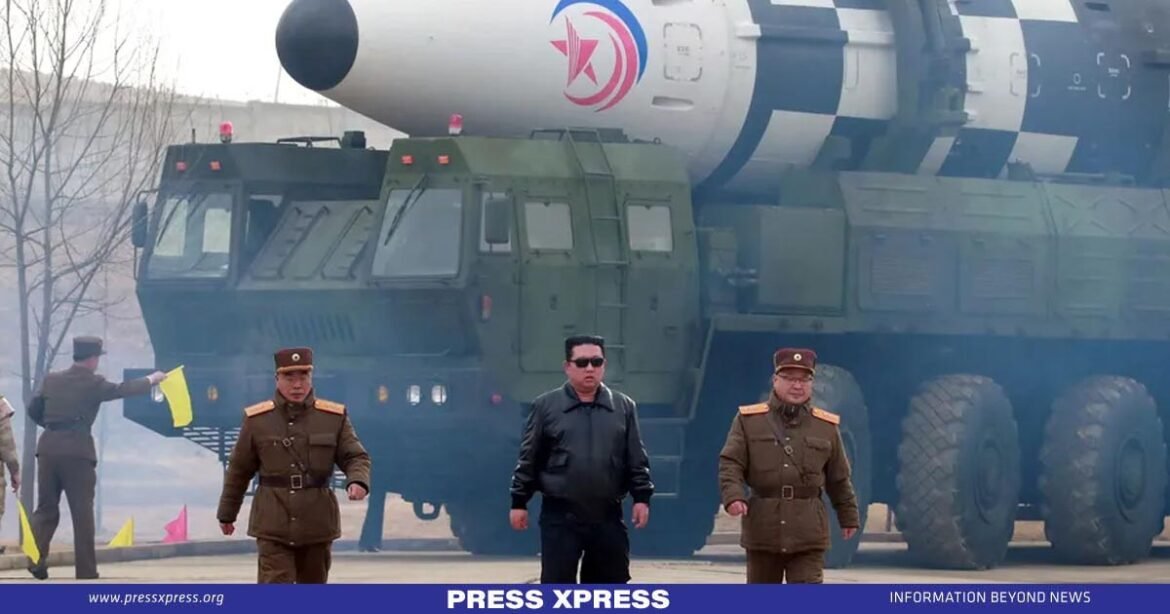The situation remains a matter of serious international concern, and close monitoring and diplomatic efforts are crucial to address the issues surrounding North Korea’s nuclear program
North Korea issued a sharp rebuke on Monday, accusing the International Atomic Energy Agency (IAEA) of acting as a “paid trumpeter” for the United States. The North Korean nuclear ministry criticized IAEA chief Rafael Grossi for allegedly creating a hostile atmosphere and spreading false information about an imminent 7th nuclear test.
The criticism from Pyongyang comes in response to a resolution passed by the IAEA General Assembly on September 29, which called for North Korea to cease its nuclear program.
You can also read: Troubled US soldier ends in North Korean custody at DMZ
In a statement, the North Korean ministry warned the IAEA against being seen as a mouthpiece for the United States and urged the agency to focus on addressing global issues such as U.S. nuclear proliferation through initiatives like Japan’s nuclear-contaminated discharges under the AUKUS agreement. AUKUS is a trilateral pact involving the U.S., UK, and Australia, centered on providing Australia with nuclear-powered submarines.
The ministry also expressed strong condemnation of the IAEA’s recent actions, accusing the agency of deviating from its mission of international neutrality and aligning itself too closely with the United States.
North Korea highlighted its withdrawal from the IAEA in the early 1990s, emphasizing that the agency lacks the authority or legitimacy to comment on North Korea’s exercise of sovereignty. It asserted that North Korea’s status as a nuclear-armed state is irreversible, and it warned against any attempts to challenge its sovereignty.
The statement concluded by reiterating North Korea’s stance and criticizing the IAEA Director General for what it perceived as biased behavior unbecoming of the head of an international organization. It firmly asserted that as long as the U.S. and other imperialist powers maintain a nuclear presence in the region, North Korea will remain a nuclear-armed state, resolute in protecting its sovereignty.
UN Nuclear Agency Detects Resumption of Work at North Korea’s Main Nuclear Reactor
The United Nations Nuclear Agency has reported that North Korea appears to have restarted operations at its primary nuclear reactor for the production of weapons-grade fuel. This development coincides with North Korea’s public declarations of intent to expand its nuclear arsenal, amid stalled nuclear negotiations with the United States.
The annual report from the International Atomic Energy Agency (IAEA) specifically references the 5-megawatt reactor located at the Yongbyon nuclear complex, situated north of Pyongyang. This reactor plays a pivotal role in producing plutonium, a key component used in the production of nuclear weapons, alongside highly enriched uranium.
The IAEA report notes, “Since July 2021, there have been indications of cooling water discharges consistent with reactor operation.” Additionally, it highlights the operation of the radiochemical laboratory within Yongbyon from mid-February to early July this year. This timeframe aligns with a prior reprocessing campaign announced by North Korea for the spent irradiated fuel from the reactor. The laboratory is instrumental in the extraction of plutonium through the reprocessing of spent fuel rods from the reactor.
IAEA expressed deep concern over North Korea’s nuclear activities
The IAEA expressed deep concern over North Korea’s nuclear activities, emphasizing, “(North Korea’s) nuclear activities are a cause for serious concern. Furthermore, new indications of the operation of the 5-MW reactor and radiochemical laboratory are deeply concerning.”
It is worth noting that the IAEA has not had access to Yongbyon or other North Korean locations since the country expelled IAEA inspectors in 2009. The agency relies on satellite imagery and open-source information to monitor developments in North Korea’s nuclear program.
The Yongbyon complex also houses facilities for the production of highly enriched uranium. The IAEA report mentioned, “There have been indications for some time that the reported centrifuge enrichment facility was not operational,” although routine activities were observed.
Yongbyon, often referred to as the “heart” of North Korea’s nuclear program, has been a subject of international concern for many years. The exact quantity of weapons-grade plutonium or highly enriched uranium produced at Yongbyon and its storage locations remain undisclosed.
In early 2019, North Korean leader Kim Jong Un proposed dismantling the entire complex during talks with then-U.S. President Donald Trump, contingent on comprehensive sanctions relief. The proposal was rejected by the U.S., as it was perceived as a partial surrender of North Korea’s nuclear capabilities.
North Korea is suspected of operating several uranium enrichment facilities, and estimates suggest it possesses a significant number of nuclear weapons, ranging from 20 to 60, as of a South Korean assessment in 2018.
In recent months, North Korea has issued warnings of expanding its nuclear program unless the United States alters its “hostile” policy, which appears to reference U.S.-led sanctions and joint U.S.-South Korean military exercises. Kim Jong Un’s sister, Kim Yo Jong, recently asserted that North Korea would establish “absolute deterrence” in response to heightened U.S. threats.
Both South Korea and the United States are closely monitoring North Korea’s nuclear activities, with the Biden administration coordinating closely with its allies and partners in response to these developments.
Conclusion
North Korea’s sharp criticism of the International Atomic Energy Agency (IAEA) and the detected resumption of its nuclear reactor operations underscore the ongoing challenges and complexities surrounding North Korea’s nuclear ambitions. These developments occur against the backdrop of stalled diplomatic negotiations and escalating tensions in the region. The situation remains a matter of serious international concern, and close monitoring and diplomatic efforts are crucial to address the issues surrounding North Korea’s nuclear program.


